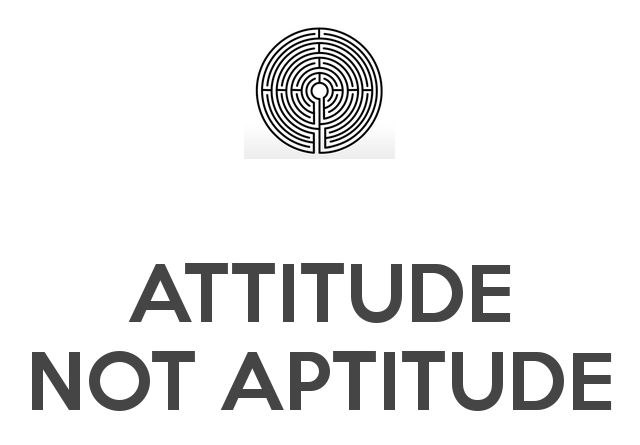By Pri Notowidigdo
Have you ever asked yourself why somebody in your organization didn’t work out? Have you ever wondered what you could have done differently? Have you ever thought about what makes somebody the right person to hire?
I found myself asking these questions in the midst of advising a client who wanted to terminate an employee. My client had originally hired the employee based solely on aptitude – the person’s skills, knowledge, and experience in his particular area. As it turned out, the employee’s attitude (how he looked at life) had a detrimental effect on the business.
It was not entirely surprising for me to hear this because after all, everything comes down to people, doesn’t it? You can train a person to have the aptitude – that is, skills, knowledge, and experience – you will need. Can you instill attitude though?.
Let’s say that a person is optimistic, energetic, pleasant, bright, willing to learn, and connects emotionally with you. Yet, he knows little about the products or services offered by your company. How much would it matter to you?
In this regard, I recall in 1984 when Paul Higgins interviewed me in Vancouver for a consulting position with Price Waterhouse Indonesia. At that time, Paul was Chairman of the Asia Pacific Region for Price Waterhouse. At the end of a three hour interview, he exclaimed that I did not know anything about management consulting. I was devastated and knew he was right. In the same breath, he then continued to say that he, nevertheless, liked my enthusiasm, my questions, and my willingness to learn new things among other things. He declared that PW would train me because I appeared to be a person with whom he would enjoy working. In a nutshell, he liked my attitude.
Say, on the other hand, that a prospective employee knows your business well, has ten years experience doing exactly what you want him to do, but has a doubtful attitude. Would you hire him? Would you wonder whether he would be quick to see the negative? Would he likely be a complainer? Would he likely not get along with fellow workers? Would he often be only thinking about his own emotional needs? You could likely say yes to these questions.
No matter how talented that person is, you will be unable to prevent him from bringing everyone’s morale down. You want your employees or associates to look forward to work. When even one person has a negative attitude and shares it around, you and the others probably wouldn’t be too excited about work. This means a failure to achieve one of the most important goals – enjoying the time you spend at work.
Good companies will have a clear corporate culture. We can also call this company chemistry. The employees will have a positive chemistry with the company. Having the insight to hire the right people is not altogether different from having the insight to marry the right person. It’s all about finding a “fit.”
You must connect with people who have a chemistry that matches yours. You must find people willing to make a commitment because they want to and not because they’re told to do so. You must enjoy being around that person quite a bit, sometimes on weekends, and often during pressure situation
During interviews with candidates, I would tend to ask them questions such as the following: What are words others use when describing you? What kind of music do you like? If you just won a lottery for 1 billion Rupiah, what would you do? What do you do for recreation? When you close your eyes, what images do you have of yourself? What’s the biggest risk you’ve ever taken? Name three people in your life whom you admire and tell me why? What do you read? Why do you want to work here? Are there any questions that I am not asking but should be?
These questions told me little about the person’s technical ability as a Finance Director, for example. However, the answers gave me an indication of the chemistry of the person, and how he might relate to the existing employees of my client.
What does all this mean? It means that you’ve got to be in close touch with your own chemistry. You’ve got to really know what you like, what drives you, what motivates you, what brings out the best in you. You’ve also got to be in touch with your company’s chemistry. This will enable you to hire people with the chemistry that easily fits with it. Such a fit should feel right and natural if it’s going to work. If you’re not fully at ease with a proposed relationship, that’s a sign that you should keep looking for a different one.
The next time you are trying to connect with a person, ask yourself how well he measures up to the following questions: Does he communicate clearly? Does he show humility and respect for other people? Is he optimistic and enthusiastic? Does he project a lot of physical and mental energy? Is there still a desire to learn new things and continually improve? Does he have a pleasant personality? Is he creative and resourceful? Is his life in order?
If he can say yes to these questions, then he possesses the key traits to maximize his potential, to grow professionally, and to contribute positively to your organization.
If the person you hire or establish a relationship with reflect these traits, you will not need to worry too much about his experience in your area of work. You can train him to excel at the job for which you need him. You cannot, though, train him to have the traits above or to have a positive attitude.
Life and business is about people. Investing the time and energy in choosing the right person will be one of the most rewarding activities for you both professionally and personally. And, if you are the individual on the other side, reflecting on whether you can provide this kind of value to a company will also have equally rewarding returns for you.
Pri Notowidigdo
The Amrop Hever Group
Global Executive Search
Bapindo Plaza, Citibank Tower, 14/F
Jl. Jend. Sudirman, Kav 54-55
Jakarta 12190, Indonesia
E-mail: prijkt@cbn.net.id , jakarta@amrophever.comÂ
Web-site: www.amrophever.comÂ






